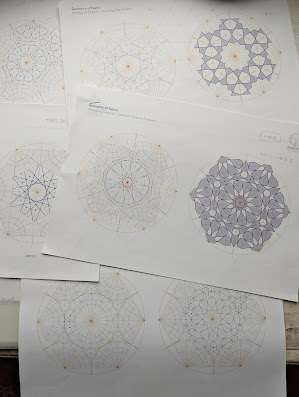So much left to do!
margaret-cooter
Looking and thinking, seeing and doing
01 December 2022
Found during studio cleanup
So much left to do!
25 November 2022
Woodblock printing - Construction Lines series 2
These prints use the invisible basis of patterns created by traditional geometry (drawing patterns with just compasses and straight edge). In the first series I tried to add the pattern itself to the grid - that turned out unexpectedly!
This time I was after the interaction between the grid of circles (flower of life) and the overlying grid of lines from which the shapes were chosen.
23 November 2022
Before and after - the blinds
It gets too chaotic -
If you're wondering where all the stuff from the worktop went ... "it's behind you!"
Gradually the heaps are diminishing. Eating the elephant one bite at a time.
14 November 2022
Lockdown wardrobe - and a little book
During lockdown one of my amuseuments was to "shop my closet" in search of favourite outfits. This is six months' worth. Quite a few items have moved on...
It started with the skirts (some of the many are shown above right) - I tried them all on, and wore some of them one last time before putting them in the donations box, taking them back where they came from!
As winter approaches and we're keeping the thermostat low, I have different priorities, different needs - warm clothes! (And always - comfortable shoes.)
Sometimes the reason you can't find anything to wear is that you have too many clothes. Too much choice.
On the closet/wardrobe theme, a little book I made in 2002 has surfaced. The original had brightly coloured tissue paper glued down, and then printed on with simple shapes made with waterproof glue, wood glue I think. This is a photocopy -
12 November 2022
Recent geometry
Practising painting (watercolours). Choosing colours can be difficult; currently I seem to be want to use blues, so many different shades...
Building up a stock of greetings cards.
04 November 2022
Monotypes
Aka monoprints. To my mind, monoprints are the amateur version, and monotype is what they become in a gallery or exhibition.
So these are monoprints. Trials. Experiments. They turned up during a recent studio rummage and brought back memories of a summer class (a whole week of entire days) at City Lit, in which I used a kettle as starting point/subject. It started with drawing and printmaking, and moved on to painting, and was in 2016 (see here).The folder of work from the class sits upstairs; when I looked at its contents a year or so ago, I wasn't ready to discard them yet. Still thinking "I might use these later", why is that?
02 November 2022
William Kentridge at the RA
A show (till 11 Dec 2022) with large work, and many short films - Kentridge's early career was in theatre.
 |
| Early drawings, 1988 some of them |
 |
| Tapestry designs |
 |
| Colonial landscapes |
 |
| Using found encyclopedia pages for a book |
 |
| ...so bold and striking |
 |
| Found pages used as basis of collage "flower drawings" |
 |
| Detail |
 |
| Some sculptures scattered around |
 |
| Drawn on paper, glued to cloth - it folds up like a map |
 |
| In the last room the film is Sybil, 2022 |
 |
| ...and into the gift shop - lovely beading... |
31 October 2022
Geometry of 12
A five-day course at Princes School of Traditional Arts, tutor Ameet Hindocha, who aimed to teach us how to look at the pattern and see what's going on, rather than give us instructions to follow. He demonstrated the construction of 12 patterns, and guided us through combining two into "our own" pattern, and gave us handouts for them all.
I'll start with "my own" pattern, which looks unfunished - that's deliberate. The finished section can be "rubbed off" onto watercolour paper and painted, and the unfinished section (at top) shows some basic structure.
However the main structure is on the sheet underneath, and it's derived from a design exercise using square and triangular tiles, with sides of the same length so they can be combined. My own design is utterly useless for this (too much white space!) but I enjoyed seeing how different shapes of white space emerged
First and last patterns, hexagonal and square format -


















































